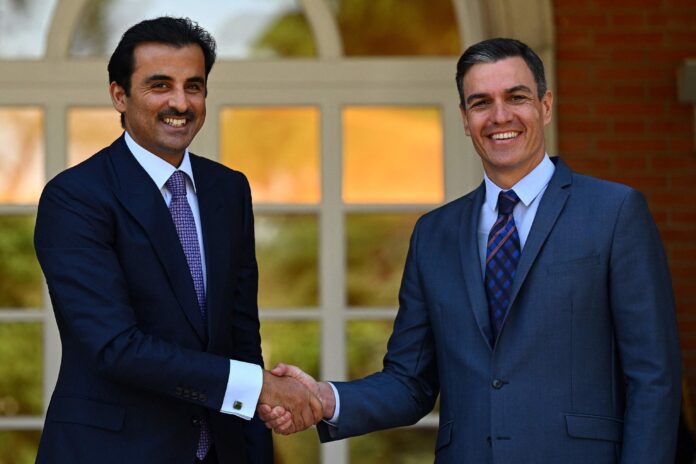The state visit to Spain by the emir of Qatar, Tamim bin Hamad Al Thani, was seen as a key opportunity for the Government to attract investment and ensure the purchase of Qatari gas, in the framework of the energy crisis in Europe due to the war in Ukraine and the diplomatic tension between our country and Algeria, the main supplier. The joint declaration between the two countries expressly includes a point in which they agree on a “boost for our collaboration in the fields of energy, defence, education and sports”.
The emir’s visit, with an important economic background, has met the Government’s expectations: investments are signed and the commitment that Spain is a strategic partner in energy matters. “Promote relations between the two countries, united by ties of friendship, to build a new strategic alliance”, includes the text agreed by both countries.
Although the Government presumes to have a diversified purchase of gas, which does not give it, unlike other European countries, a firm dependence on a supplier -as is the case with Russia and various countries-, the truth is that the tension with Algeria Account of the Executive’s turn regarding Western Sahara and the energy crisis derived from the war in Ukraine made it essential to seal a framework of understanding and collaboration with Qatar, the world’s leading exporter of liquefied natural gas, according to Bloomberg data for the month of April.
“Spain and Qatar stressed the importance of a stable and fruitful cooperation in the field of energy and gas, since Qatar is one of the main gas suppliers to Spain and has always proven to be a loyal and responsible partner”, it is collected in the joint statement. The Government hopes that, above all, from 2024 the flow of gas in Qatar will become more important.
Why from that date? Because Qatar currently has an annual gas production capacity of 77 million net tons, which it plans to increase to 110 million by 2024. This state is the third country in the world with the largest natural gas reserves after Russia and Iran.
In 2021, Qatar was the fifth largest supplier to Spain, supplying 6.3% of liquefied natural gas (LNG), behind Russia (8.9%), Nigeria (11.4%), the US (14.2%). ) and Algeria (42.7%). A total of 30 methane tankers were received from Qatar last year, compared to 64 and 51 from the US or Nigeria, respectively, or 38 from Algeria.
Tamim bin Hamad Al Thani announced at the gala dinner hosted by Felipe VI that he will invest 4,720 million in Spain due to the confidence he has in the “solidity” of the Spanish economy. The objective of attracting investment from a state that has a sovereign fund with assets worth 450,000 million was achieved.
The joint declaration signed this Wednesday in La Moncloa includes the purpose of establishing a renewed framework for investment, finance, trade and economic cooperation. Here is the signing of a Memorandum of Understanding between the Qatar Investment Authority (QIA) and Cofides, a public-private partnership that manages State funds, to capitalize projects to broaden and deepen their working relationship and identify new opportunities for investment.
Although the Government avoids detailing the projects, they will be framed in the field of ecological transition, digital transition, hydrogen storage, industrial autonomy, infrastructure… The Government opens the door to all options: investment only in Qatar, from the hand of Cofides, alliance with Spanish companies… But that they invest, is the purpose that is pursued.
The projects framed in the European Next Generation funds are a window of opportunity, they consider in the Government, to attract Qatari investment. In fact, both countries recognize that “it could be the framework for future co-investment opportunities.” In fact, Pedro Sánchez and Emir Tamim bin Hamad Al Thani positively valued “the importance and future impact of the Recovery, Transformation and Resilience Plan for Spain, within the framework of the general initiative of the Next Generation EU funds”.
A concern and concern within the Government was to increase the trade balance with Qatar, since in La Moncloa it was considered that the numbers were insufficient and that there was much more potential both to attract investment and for Spanish companies to explore business opportunities. , especially in terms of infrastructure or energy. The text signed by the two leaders reflects the “common desire to increase bilateral trade and take advantage of the great potential for existing growth.”
The trade balance between the two states before the pandemic was around 1.2 billion, 900 million of Qatari exports to Spain and about 400 the other way around. An amount considered insufficient for La Moncloa.
Human rights in Qatar are a pending issue in terms of labor, freedom of expression and sexuality, according to international organizations such as Amnesty International. The joint declaration refers to this matter showing “unwavering” support from Spain and Qatar “unwavering” for the purposes and principles of the Charter of the United Nations, specifically respect for human rights and the prohibition of the use of force against territorial integrity or political independence of any State, fundamental basis of international relations”.
Conforms to The Trust Project criteria








